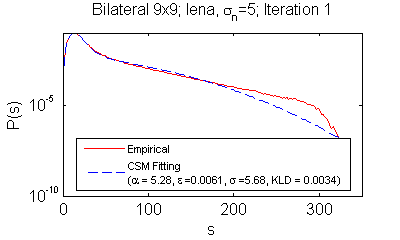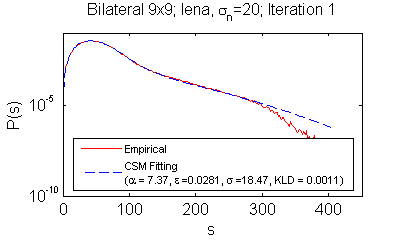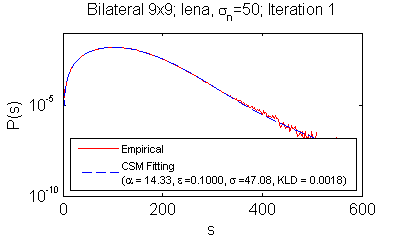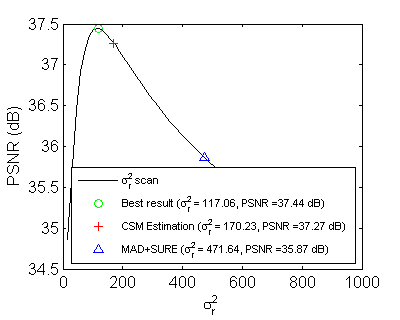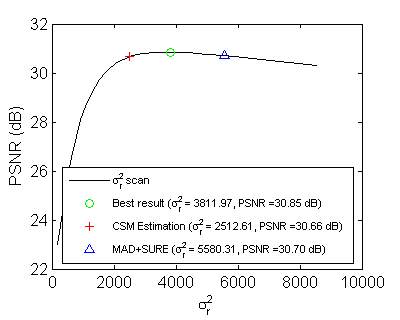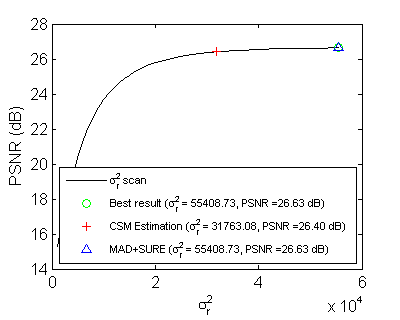Bayesian Inference for Neighborhood Filters with Application in Denoising
National Tsing Hua University, Department of Electrical Engineering
|
Abstract Range-weighted neighborhood filters are useful and popular for their edge-preserving property and simplicity, but they are originally proposed as intuitive tools. Previous works needed to connect them to other tools or models for indirect property reasoning or parameter estimation. In this work, we introduce a unified empirical Bayesian framework to do both directly. A neighborhood noise model is proposed to reason and infer the Yaroslavsky, bilateral, and modified non-local means filters by joint maximum a posteriori and maximum likelihood estimation. Then the essential parameter, range variance, can be estimated via model fitting to the empirical distribution of an observable chi scale mixture variable. An algorithm based on expectation-maximization and Quasi-Newton optimization is devised to perform the model fitting efficiently. Finally, we apply this framework to the problem of color-image denoising. A recursive fitting and filtering scheme is proposed to improve the image quality. Extensive experiments are performed for a variety of configurations, including different kernel functions, filter types and support sizes, color channel numbers, and noise types. The results show that the proposed framework can fit noisy images well and the range variance can be estimated successfully and efficiently. Publications C.-T.
Huang, "Bayesian Inference
for Neighborhood Filters with Application in Denoising,"
IEEE Trans. Image Processing,
vol. 24, no. 11, Nov 2015. C.-T. Huang, "Bayesian Inference
for Neighborhood Filters with Application in Denoising," IEEE CVPR 2015.
Source Code Matlab code for
reproducing the results for Yaroslavsky and bilateral filters,
which includes getting CSM pdf, EM+ fitting, and filtering. |
|
Supplementary Data for Experimental Results Please click on the following links for the detailed fitting and filtering results: - Yaroslavsky 5x5 filter (ϵbd=0.1) (ϵbd=1.0) - Yaroslavsky 9x9 filter (ϵbd=0.1) (ϵbd=1.0) - Bilateral 9x9 filter (ϵbd=0.1) (ϵbd=1.0) - Bilateral 13x13 filter (ϵbd=0.1) (ϵbd=1.0) - MNLM-Simple filter (ϵbd=0.1) - MNLM-DCT filter (ϵbd=1.0) - Bilateral 9x9 filter on Multispectral image HYDICE with selected frequency bands (k=3~9) - Bilateral 9x9 filter with generalized kernels: (Laplacian) (GGD4) (Epanechnikov) (Biweight) (Triweight) (Uniform) - Bilateral 9x9 filter on different noise types (Uniform/Possion/S&P) - Natural image gradients (four-connected neighborhood) (gradient) Note:
1. Best viewing resolution is 1920x1080. Otherwise, you
may need to zoom out the webpage for a good viewing experience. Acknowledgement This work was supported by the Ministry of Science and Technology, Taiwan, R.O.C. under Grant No. MOST 103-2218-E-007-008-MY3.
Last update on Dec 7, 2015 |
